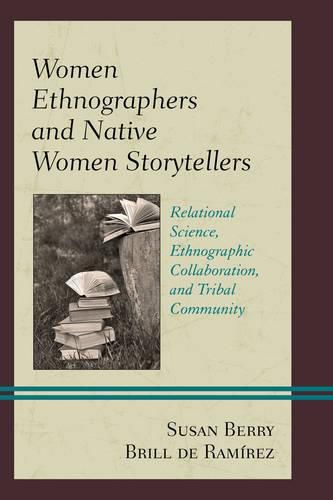Readings Newsletter
Become a Readings Member to make your shopping experience even easier.
Sign in or sign up for free!
You’re not far away from qualifying for FREE standard shipping within Australia
You’ve qualified for FREE standard shipping within Australia
The cart is loading…






This book focuses on the collaborative work between Native women storytellers and their female ethnographers and/or editors, but the book is also about what it is that is constitutive of scientific rigor, factual accuracy, cultural authenticity, and storytelling signification and meaning. Regardless of discipline, academic ethnographers who conducted their field work research during the twentieth century were trained in the accepted scientific methods and theories of the time that prescribed observation, objectivity, and evaluative distance. In contradistinction to such prescribed methods, regarding the ethnographic work conducted among Native Americans, it turns out that the intersubjectively relational work of women (both ethnographers and the Indigenous storytellers with whom they worked) has produced far more reliably factual, historically accurate, and tribally specific Indigenous autobiographies than the more scientifically objective approaches of most of the male ethnographers.
This volume provides a close lens to the work of a number of women ethnographers and Native American women storytellers to elucidate the effectiveness of their relational methods. Through a combined rhetorical and literary analysis of these ethnographies, we are able to differentiate the products of the women’s working relationships. By shifting our focus away from the surface level textual reading that largely approaches the texts as factually informative documents, literary analysis provides access into the deeper levels of the storytelling that lies beneath the surface of the edited texts. Non-Native scholars and editors such as Franc Johnson Newcomb, Ruth Underhill, Nancy Lurie, Julie Cruikshank, and Noel Bennett and Native storytellers and writers such as Grandma Klah, Maria Chona, Mountain Wolf Woman, Mrs. Angela Sidney, Mrs. Kitty Smith, Mrs. Annie Ned, and Tiana Bighorse help us to understand that there are ways by which voices and worlds are more and less disclosed for posterity. The results vary based upon the range of factors surrounding their production, but consistent across each case is the fact that informational accuracy is contingent upon the the degree of mutual respect and collaboration in the women’s working relationships. And it is in their pioneering intersubjective methodologies that the work of these women deserves far greater attention and approbation.
$9.00 standard shipping within Australia
FREE standard shipping within Australia for orders over $100.00
Express & International shipping calculated at checkout
This book focuses on the collaborative work between Native women storytellers and their female ethnographers and/or editors, but the book is also about what it is that is constitutive of scientific rigor, factual accuracy, cultural authenticity, and storytelling signification and meaning. Regardless of discipline, academic ethnographers who conducted their field work research during the twentieth century were trained in the accepted scientific methods and theories of the time that prescribed observation, objectivity, and evaluative distance. In contradistinction to such prescribed methods, regarding the ethnographic work conducted among Native Americans, it turns out that the intersubjectively relational work of women (both ethnographers and the Indigenous storytellers with whom they worked) has produced far more reliably factual, historically accurate, and tribally specific Indigenous autobiographies than the more scientifically objective approaches of most of the male ethnographers.
This volume provides a close lens to the work of a number of women ethnographers and Native American women storytellers to elucidate the effectiveness of their relational methods. Through a combined rhetorical and literary analysis of these ethnographies, we are able to differentiate the products of the women’s working relationships. By shifting our focus away from the surface level textual reading that largely approaches the texts as factually informative documents, literary analysis provides access into the deeper levels of the storytelling that lies beneath the surface of the edited texts. Non-Native scholars and editors such as Franc Johnson Newcomb, Ruth Underhill, Nancy Lurie, Julie Cruikshank, and Noel Bennett and Native storytellers and writers such as Grandma Klah, Maria Chona, Mountain Wolf Woman, Mrs. Angela Sidney, Mrs. Kitty Smith, Mrs. Annie Ned, and Tiana Bighorse help us to understand that there are ways by which voices and worlds are more and less disclosed for posterity. The results vary based upon the range of factors surrounding their production, but consistent across each case is the fact that informational accuracy is contingent upon the the degree of mutual respect and collaboration in the women’s working relationships. And it is in their pioneering intersubjective methodologies that the work of these women deserves far greater attention and approbation.